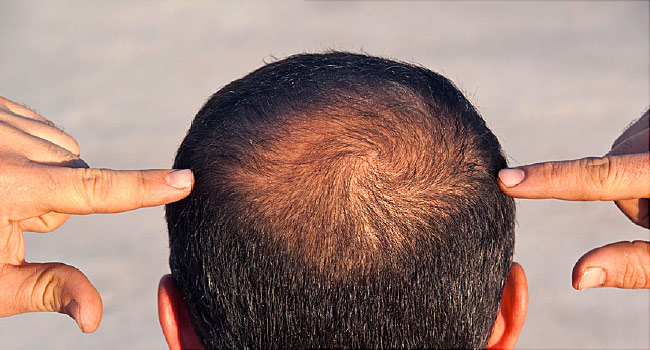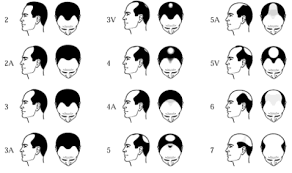
Hair Loss treatment
Hair loss affects millions of men & women around the world. Hair loss with receding hair line is upsetting for everyone. It brings a great sense of alarm & fear and makes one feel low in confidence & self esteem. The number of hair an individual has is already determined at birth. With age new hair are not created but existing hair may become thicker & healthy or thinner & weak under the effect of hormones. Individual hair grows for 3-5 years and then fall-off. In that spot new hair will grow after 3 months. Normally each day about 100 hairs fall off. This growth-regression-relaxation cycle is repeated in every hair follicle. .


HAIR GROWTH CYCLE:
Anagen Phase: This is active hair growth phase. During this phase, the cells of hair root rapidly grow & divide. Anagen phase lasts from two to six years. Hairs in this phase grow one centimeter each month. Naturally people who are able to grow their hairs very long & quickly have ‘long anagen phase’. The growth in anagen phase is different in different in different parts of body. While scalp hairs have long anagen phase, the hairs in eyebrows, eyelashes & body hairs have very short anagen phase.
Catagen Phase: During catagen phase growth of hair stops & hair root shrinks.
Telogen phase: This is ‘resting’ phase of the hair growth cycle & lasts for approximately 100 days. The follicle is at rest with whitish bulb at the root. Normally between 25 to 100 telogen hairs shed off every day.
How are the causes of hair fall diagnosed?
Since hair loss can be caused by a number of factors, the first step should be to consult an expert hair transplant surgeon . The doctor will perform a general physical exam for you and ask you a number of questions to glean your and your family’s medical history.
The physician will ask you:
How noticeably is your hair thinning?
How many hair strands do you lose per day?
Since how long do you have excessive hair loss?
Does your family have a history of hair loss?
Tell me about your diet.
What are your hairstyling habits? Do you use heat often to style your hair?
Have you suffered from any recent illnesses, especially skin rashes or allergies?
Do you have any health problems such as thyroid problems, arthritis etc?
Do you suffer from stress or depression?
Are you taking any medicines for thyroid problems, arthritis, depression or any heart-related issues?
Based on your responses and overall general health, the doctor may then advise you to undergo the following tests:
Blood Test: to determine if you suffer from any health problems such as thyroid.
Pull Test: in which the doctor will pull your hair to see how many hairs come out on an average.
Scalp Biopsy: in which the doctor will scrape some skin and a few hairs from your scalp to check if you suffer from any kind of scalp infection.
Light Microscopy: which will help diagnose any disorders of the hair shaft you may suffer from.
Hair loss can occur due to a poor diet, stress, vitamin deficiency, thyroid problems, pregnancy, treatments like chemotherapy, or due to ageing. These conditions are not very serious and can be addressed easily by taking medicines, or stopping certain medicines, and changing your lifestyle. Very often the hair grows back.
If your hair loss is due to genetic reasons or medical conditions, your hair may not grow back naturally. This can be distressing for you as hair loss can affect your overall appearance. Under such circumstances, based on your general physical health and the pattern and severity of hair loss, and your doctor’s suggestions, you may consider a couple of medical procedures, which can help alleviate your condition.

